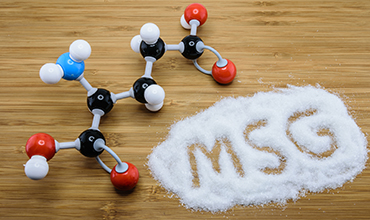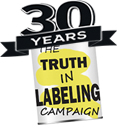MSG
Manufactured vs Natural Glutamic Acid
Ingredient Names Used to Hide MfG
Truth in Labeling Campaign> MSG
Consumers adopted the acronym “MSG” to stand for toxic processed free glutamic acid – whether that processed free glutamic acid stands by itself (L-glutamic acid), or is a component of an ingredient such as soy protein isolate, maltodextrin, natural flavoring, or monosodium glutamate. Largely because those in the glutamate industry have built on the confusion caused by using “MSG” incorrectly, we thought it time that there be a proper acronym for consumers to use when talking about what’s contained in monosodium glutamate that causes their pain and suffering – distinguishing between the product called “monosodium glutamate” and the toxic ingredient contained in it. We propose to use MSG just as the Glutes do, to stand for the flavor enhancer, “monosodium glutamate,” but will now refer to the amino acid in monosodium glutamate that causes brain damage, endocrine disorders and adverse reactions, by its more factual name – Manufactured free Glutamate or MfG.

MSG
Monosodium glutamate was invented and patented in 1909, after Kikunae Ikeda observed that glutamic acid in sea weed gave seaweed its flavor-enhancing characteristics. Monosodium glutamate is composed of processed/manufactured free glutamic acid, the unwanted by-products of manufacture that accompany its production (impurities), sodium, and possibly moisture. Some years earlier, Ikeda had studied with German chemists Rittenhausen and Wolff – pure scientists trying to identify the chemical properties of the various protein substances. According to George Schwartz*, glutamic acid had been synthesized in 1890, and Ikeda learned the chemical techniques of identification and synthesis during an apprenticeship of several years. The products of the German chemists are the hydrolyzed proteins.Basic to understanding MSG
"MSG" definedIndustry uses of the acronym “MSG” to stand for the flavor enhancer, “monosodium glutamate.”
Consumers adopted the acronym “MSG” to stand for toxic processed free glutamic acid – whether that processed free glutamic acid stands by itself (L-glutamic acid), or is a component of an ingredient such as soy protein isolate, maltodextrin, natural flavoring, or monosodium glutamate. Largely because those in the glutamate industry have built on the confusion caused by using “MSG” incorrectly, we thought it time that there be a proper acronym for consumers to use when talking about what’s contained in monosodium glutamate that causes their pain and suffering – distinguishing between the product called “monosodium glutamate” and the toxic ingredient contained in it. We propose to use MSG just as the Glutes do, to stand for the flavor enhancer, “monosodium glutamate,” but will now refer to the amino acid in monosodium glutamate that causes brain damage, endocrine disorders and adverse reactions, by its more factual name – Manufactured free Glutamate or MfG.
What is monosodium glutamate?Distinguishing “Glutamate,” from “Monosodium Glutamate,” and “MfG”
How much MfG does it take to cause brain damage or an adverse reaction
How is MSG produced?Understanding production of MSG
More on the subject of manufactured vs. Natural glutamic acid
In what kinds of foods is MfG hidden?Hiding MfG
Ingredient names used to hide MfG
MfG in Cosmetics, supplements and Drugs
Recognizing MfG-induced adverse reactions
*George Schwartz. In Bad Taste: the MSG Syndrome, Santa Fe, Health Press, 1988.

